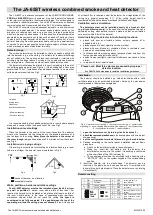
7-9
Reference
Chromatic Dispersion–theory and management
fiber-optic cable is not constant over time, making compensation difficult. This
effect will ultimately limit the highest achievable data rates for a single-wave-
length fiber optic system.
Managing chromatic dispersion
Control of the total chromatic dispersion of transmission paths is critical to the
design and construction of long-haul, high-speed telecommunications sys-
tems. The first objective is to reduce the total dispersion to the point where its
contribution to the error rate of the system is acceptable. A system consists of
many spans of fiber from different manufacturing runs, each with its own zero-
dispersion wavelength and dispersion slope at
λ
0
(
lambda-zero). The disper-
sion of a single-channel system can be controlled by connecting fibers of dif-
fering dispersion such that the total dispersion is near zero. Alternately,
dispersion may be allowed to accumulate along the path and then compen-
sated at the output of the system. For example, if an installed dispersion-
shifted fiber system exhibits negative dispersion at the chosen operating
wavelength, it can be compensated with a relatively short length of dispersion-
unshifted fiber, which has a large, positive dispersion coefficient at the same
wavelength. Dispersion can also be compensated with chirped fiber Bragg
gratings, made by exposing specially doped fiber to an interference pattern of
intense ultraviolet light. Chirping refers to an increase in the period of the
index variation as a function of distance along the fiber. Dispersion compensa-
tion is more complex in dense WDM (wavelength division multiplexing) sys-
tems.
The output power of erbium-doped fiber amplifiers (EDFA’s) is sufficient to
produce nonlinear effects in singlemode fiber. The second objective of chro-
matic dispersion compensation is to limit the impairments caused by these
nonlinearities. For example, four-wave mixing can be controlled by maintain-
ing a small negative dispersion in those portions of a span that are exposed to
high power levels. (Another approach to this problem, in wavelength multi-
plexed systems, is to space channels in unequal wavelength increments).
Summary
In high-speed, long-haul systems, chromatic dispersion must be compensated
for to minimize ordinary pulse broadening. Some chromatic dispersion must
be maintained at a small but non-zero level in regions where the optical power
is extremely high.
Chromatic dispersion measurements are performed by fiber and cable
researchers, manufacturers, and system integrators. Increasingly, chromatic
dispersion measurements are also performed during the design, manufacture,
and incoming inspection of system components, particularly chromatic disper-
Summary of Contents for 86037B
Page 1: ...User s Guide HP 86037B Chromatic Dispersion Test System ...
Page 31: ...2 13 Operation The Main Window Figure 2 4 Repeat Measurement Selector ...
Page 72: ...3 16 Normalization Setting Normalization Preferences ...
Page 94: ...4 22 Remote Control TES Parameters Main chromatic dispersion screen ...
Page 100: ...4 28 Remote Control TES Parameters CD and Gain Measurement Settings Dialog Box ...
Page 102: ...4 30 Remote Control TES Parameters Length Measurement Settings Dialog Box ...
Page 104: ...4 32 Remote Control TES Parameters Normalization Settings Dialog Box ...
Page 106: ...4 34 Remote Control TES Parameters New Normalization Button Dialog Box ...
Page 120: ...4 48 Remote Control Output Parameters ...
Page 158: ...5 38 Maintenance Hewlett Packard Sales and Service Offices ...
Page 170: ...6 12 Installation Installation ...
Page 174: ...7 4 Reference Theory of Operation Figure 7 3 HP 86037B Block Diagram Options 121 and 122 ...
Page 175: ...7 5 Reference Theory of Operation Figure 7 4 The HP 86037B Option 114 block diagram ...
Page 190: ...7 20 Reference System Options ...
Page 191: ...8 Specifications 8 3 Regulatory Information 8 7 Specifications and Regulatory Information ...
Page 204: ...Index 6 Index ...
















































